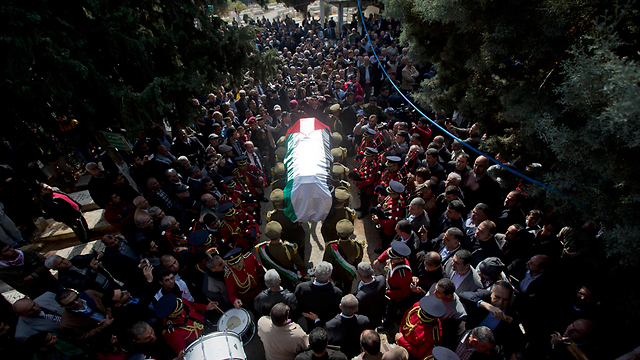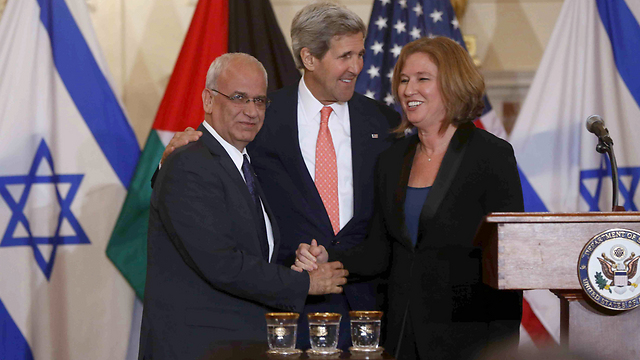
Israel-Palestinian security cooperation is not in danger
Analysis: Despite growing calls inside Palestinian Authority for an end to coordination after Ziad Abu Ein's death, arrangement at highest level is too advantageous to abandon.
From the moment of the announcement of the death of Palestinian Authority minister Ziad Abu Ein on Wednesday, calls were heard from Ramallah to halt security coordination with Israel.
The demand was first made by veteran Fatah official Jibril Rajoub, who made his threats through every Palestinian and Arab media that agreed to listen. On Thursday, he was joined by Saeb Erekat, who hinted that the Palestinian leadership conference on Friday "will make some decisions."
But, like Israel, the Palestinian Authority – against a background of inflammatory statements – has elections coming up. For the meantime at least, the security and civilian coordination between Israel and the Palestinian Authority continues as usual.
Rajoub is a politician who built his power as commander of the Palestinian Preventive Security in the West Bank. He himself was involved in security coordination with Israel and fully understands its importance to the Palestinians, as well as to Israel.
However, Rajoub is now preparing for the upcoming seventh Fatah conference, which begins next month and during which the Palestinian leadership for the day after Abbas will be decides. Rajoub sees himself as a realistic candidate to succeed the Rais, and his recent statements can be seen as an attempt to ingratiate himself with the listening audience.
The Palestinian public is angry and frustrated. It is angry at Israel and frustrated by the lack of any real response from the Palestinian Authority. The same public sees security cooperation by the leadership in Ramallah as a form of collaboration with Israel, and it is hard to swallow - let alone when a Palestinian minister dies during a popular demonstration against the Israeli occupation, even if it is from a heart attack.
Erekat today is in line with Rajoub, saying almost identical things to reporters during a briefing held in Bethlehem earlier this week - even before the incident in which Ziad Abu Ein died. On Thursday, he warned that the meeting Friday will redefine the Palestinian Authority's relations with Israel, and in the process consider ending security coordination. The Palestinians will also discuss joining the International Criminal Court at The Hague and the Geneva Conventions, and the issue of a Security Council referral for a timetable for an Israeli withdrawal from the West Bank.
"I and everyone I know are opposed to the security coordination," declared Raid Shawamreh from the A-Ram village during Thursday's funeral for Abu Ein.
"The Palestinian Authority is helping Israel in many areas, and we the common Palestinian people only see Israel doing one thing: killing, house demolitions, arrests, the siege on Gaza and endangering the al-Aqsa mosque. So why we would support security coordination? We don't want it." According to Shawamreh, if it decides to continue the security coordination, the Palestinian Authority will have a problem in terms of how it is perceived by the street.
What is the security coordination?
The phrase - which has become a symbol of cooperation between Israel and the Palestinian Authority, even in times of great tensions - actually refers not only the military aspect but also touches on numerous civilian aspects such as health, environment, water and so on. For example, efforts to prevent Ebola sufferers from entering Israel and the West Bank, the two sides took various steps and drafted common procedures for dealing with a situation in which a sufferer or a carrier of the virus was identified.
At the same time, there is also coordination in the security arena. Within that framework, the Palestinian security forces and the Israeli security and intelligence services share intelligence on threats common to both parties, such as data on Palestinian suspects in hostilities against Israel. This, for example, was how the hunt for killers of the three kidnapped Israeli youths was conducted in June.
Sometimes it means the detention of a cell that threatens the Palestinian Authority, as with the Hamas plot to incite the West Bank and thus bring about the fall of the PA government, which was uncovered by the Shin Bet several months ago,.
It is clear, however, that Israel does not hand over all information it has to Palestinians, and vice versa. The coordinating committee (civilian and military) is headed by the Coordinator of Government Activities in the Territories Major General Yoav Mordechai and Palestinian Minister for Civil Affairs Hussein al-Sheikh.
As part of the coordination, meetings are held at very high levels, such as the frequent meetings between Gen. Mordechai and Palestinian Prime Minister Rami Hamdallah. Shin Bet chief Yoram Cohen has also met with Mahmoud Abbas from time to time; at these meetings the parties discuss various issues – from security threats to the mechanism for reconstruction of the Gaza Strip.
The termination of security cooperation between the parties, if it happens, will force the Israeli security forces to change their practices in the West Bank, but that does not mean they will not be able to operate in territory fully under Palestinian control should the need arise.
On the other hand, a break in cooperation will allow Hamas to coordinate and consolidate its position and power in the West Bank, both in terms of civilian and military infrastructure - which would undermine the position of the Palestinian Authority. This is one of the reasons why Hamas frequently calls for an end to security coordination with Israel.
And although Hamas is now joined in its demand by Fatah activists, it still does not signal that the end of the coordination is nigh. An informed source in Ramallah told Ynet that the initiative is only in the declarative.
"Even if Abbas does announce tomorrow that is he stopping security coordination – the coordination will not stop. It will continue, just in a quieter and less ostentatious manner," he said.
So for at least for now there is no change - and the civil and security cooperation between the Palestinian Authority and Israel is business as usual.












